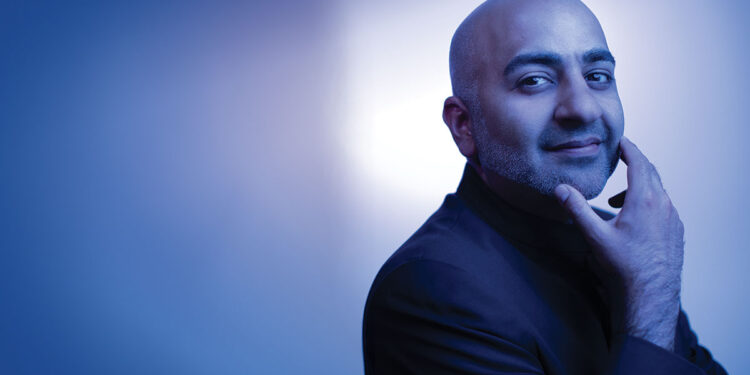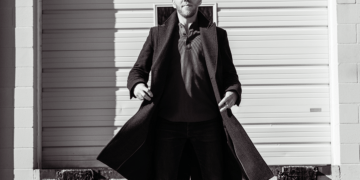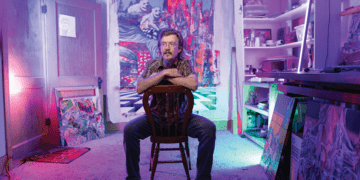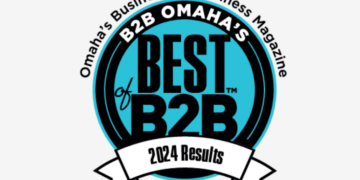March 2020 brought Omaha arts to a screeching halt, but it also brought an impactful change for the positive. Maestro Ankush Kumar Bahl met Omaha at its worst, and fell in love. A Northern California native, Bahl arrived in Omaha to explore the arts community and throw his hat in the ring to replace outgoing Thomas Wilkins, the 16-year veteran music director for the Omaha Symphony.
“Usually we’d find a replacement before the previous director stepped down,” said Dani Meier, vice president of artistic administration and a section double bassist. “We’d been fortunate to have a director we loved in Maestro Wilkins, and had the privilege of meeting with a number of truly fine conductors.” Meier’s love of music and commitment to Omaha’s talented artists didn’t create unreasonable expectations, but certainly influenced her standards as they began what they expected to be a grueling process to find Wilkins’ successor.
“Something about Maestro Bahl stood out immediately.” Meier recalled. “There was one performance I’ll never forget. We were performing Swan Lake. Typically, we’d play highlights of Tchaikovsky, but Maestro Bahl asked us to include a movement to the suite that isn’t traditionally played, the finale of the ballet. We reached this massive crescendo we don’t usually get to play, and as we finished you could hear a pin drop. After a moment, you heard from the balcony—one man just sighed ‘Wow’ before the applause erupted.”
Meier continued, “Maestro has spent years thinking about what he wants from an orchestra. He’s never going to just hope it’s going to be a good show. He wants to be sure everyone is growing artistically, not just getting to play great music, but making you fall in love with each piece the way you did the first time you heard it. Your hands know what to do in your sleep, but he wants a living, organic, fresh performance, and he knows how to make the music feel new again.
The Symphony board and performers thought the search for a new maestro would be long. By summer 2020, the announcement had been made that Bahl would be the new music director.
“We insisted on having him back before his tenure officially even began this September,” Meier said.
The start of the COVID-19 pandemic is not what Bahl recalls from his early Omaha impressions. “I’ve conducted all over the world. But when I got here, everyone completely blew me away. The Holland is just beautiful. The board and community support is absolutely expansive. This community really cares about the performing arts Omaha offers. They recruited me in many ways, but it was really just such fertile ground that would marry with my vision for the orchestra.”
Bahl doesn’t come from a family of musicians, but what he did inherit from his parents was a disciplined work ethic, a deep respect for people’s time and talent, and a desire to bring out the best in those around him.
“My job is to make sure everyone brings it,” Bahl said. “Like a movie director or a football coach. I’m not on screen or the field, but I see what everyone [has] brought and decide if I’m motivating or directing this person. It’s kind of improv, taking what they’re giving me and putting it where it belongs. Some days it’s about showing them where to put their energy, some days it’s about inspiring them to find the energy in the first place.”
Bahl continued, “There’s a relationship, and trust involved. An orchestra can tell if the conductor is there for them, the music, or if they’re all ego. You’ve got the privilege of leading highly trained, extremely talented musicians who each got here on their own. They spent years with their instrument, had the discipline to practice daily for decades, some are older or more experienced than I am, some went to Juilliard, and I have to show them why they can count on me to lead them. Personally, I love that first impression. That moment I have to earn their trust, to prove my substance.”
Bahl is using that trust and talent to do more than charm his orchestra, he’s aiming it directly at Omaha audiences.
“There’s this huge wall of people who think the symphony isn’t meant for them,” he said. “They don’t know what to wear; parking or traffic overwhelms them. Sometimes they worry about the cost. But when you hear the theme to Jurassic Park, you’re feeling exactly what John Williams wanted you to feel. He made that for everyone, and Beethoven wrote music to be accessible for everyone. Nobody should deprive themselves of that.”
His efforts to reach more of his new neighbors include strengthening the orchestra’s storytelling capacity with added visuals, narration, and context, and creating accessible shows and opportunities for everyone. The Omaha Symphony performs more than 200 shows each year.
Learn more and find tickets at omahasymphony.org
This article originally appeared in the July/August 2022 issue of Omaha Magazine. To receive the magazine, click here to subscribe.













